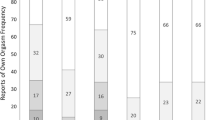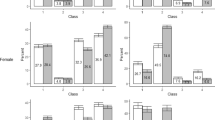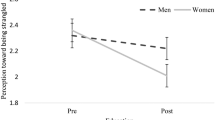Abstract
To assess whether pressuring others to use HIV self-tests is prevalent among US men who have sex with men (MSM), we analyzed data from a randomized controlled trial of HIV self-testing. Among 752 online-recruited MSM who received HIV self-tests and responded to a 12-month survey, 8.5% (60/709) reported pressuring someone to use an HIV self-test: 29 pressured a friend, 28 pressured a sexual partner, and 1 pressured a family member. Conversely, 2.1% (15/715) reported being pressured to self-test: 12 by a sexual partner and 3 by a friend. No physical harm was reported. HIV prevention programs that use HIV self-tests to reach populations at risk for HIV may be reassured by our findings because, despite reports of pressure to use HIV self-tests, no physical abuse was reported between sex partners. These programs should, however, include messages emphasizing the voluntary use of HIV self-tests and be prepared to address concerns of persons who have been pressured to use HIV self-tests. This trial is registered at www.clinicaltrials.gov (NCT02067039) and the date of registration is February 5, 2014.
Resumen
Analizamos los datos de un ensayo controlado aleatorio (ECA) de 12 meses para evaluar si presionar a alguien a que utilice la autoprueba del VIH es una ocurrencia frecuente entre hombres estadounidenses que tienen sexo con hombres (HSH) reclutados via el internet. Entre 752 HSH que recibieron por correo autopruebas del VIH y que respondieron a una encuesta a los 12 meses del ECA, el 8.5% (60/709) informó haber presionado a alguien a que usara una autoprueba del VIH: 29 presionaron a un amigo, 28 presionaron a una pareja sexual y uno presionó a un miembro de su familia. Por el contrario, el 2.1% (15/715) informó haber sido presionado a usar la autoprueba: 12 por una pareja sexual y 3 por un amigo. Ningun participante reporto daños físicos. Los programas de prevención del VIH que utilizan autopruebas del VIH para alcanzar a poblaciones a riesgo de contraer el VIH, pueden sentirse tranquilizados por nuestros hallazgos porque, a pesar de los reportes de presión para usar las autopruebas del VIH, no se reporto abuso físico entre parejas sexuales. Sin embargo, los programas deben incluir mensajes que enfaticen el uso voluntario de las autopruebas del VIH y estar preparados para calmar las preocupaciones de las personas que han sido presionadas a usar las autopruebas del VIH. El ensayo está registrado en www.clinicaltrials.gov (NCT02067039) y la fecha de registro es el 5 de febrero de 2014.
Similar content being viewed by others
Data Availability
Not applicable.
Code Availability
Not applicable.
References
Centers for Disease Control and Prevention. HIV Surveillance Report, 2018 (Updated); vol. 31. http://www.cdc.gov/hiv/library/reports/hiv-surveillance.html. Published May 2020. Accessed 5 Oct 2020.
DiNenno EA, Prejean J, Irwin K, et al. Recommendations for HIV screening of gay, bisexual, and other men who have sex with men—United States, 2017. MMWR Morb Mortal Wkly Rep. 2017;66(31):830–2.
Centers for Disease Control and Prevention. HIV infection risk, prevention, and testing behaviors among men who have sex with men—National HIV Behavioral Surveillance, 23 U.S. Cities, 2017. HIV Surveillance Special Report 22. https://www.cdc.gov/hiv/library/reports/hiv-surveillance.html. Published February 2019. Accessed 5 Oct 2020.
Carballo-Diéguez A, Frasca T, Balan I, et al. Use of a rapid HIV home test prevents HIV exposure in a high risk sample of men who have sex with men. AIDS Behav. 2012;16(7):1753–60. https://doi.org/10.1007/s10461-012-0274-2.
Carballo-Diéguez A, Giguere R, Balán I, et al. Few aggressive or violent incidents are associated with the use of HIV self-tests to screen sexual partners among key populations. AIDS Behav. 2020;24(7):2220–6. https://doi.org/10.1007/s10461-020-02809-1.
Masters SH, Agot K, Obonyo B, Mavedzenge SN, Maman S, Thirumurthy H. promoting partner testing and couples testing through secondary distribution of HIV self-tests: a randomized clinical trial. PLoS Med. 2016;13(11): e1002166. https://doi.org/10.1371/journal.pmed.1002166.
Thirumurthy H, Masters SH, Mavedzenge SN, Maman S, Omanga E, Agot K. Promoting male partner HIV testing and safer sexual decision making through secondary distribution of self-tests by HIV-negative female sex workers and women receiving antenatal and post-partum care in Kenya: a cohort study. Lancet HIV. 2016;3(6):e266-274. https://doi.org/10.1016/S2352-3018(16)00041-2.
Kumwenda MK, Johnson CC, Choko AT, et al. Exploring social harms during distribution of HIV self-testing kits using mixed-methods approaches in Malawi. J Int AIDS Soc. 2019;22(Suppl 1): e25251. https://doi.org/10.1002/jia2.25251.
Ong JJ, Li H, Dan W, et al. Coercion and HIV self-testing in men who have sex with men: implementation data from a cross-sectional survey in China. J Acquir Immune Defic Syndr. 2018;77(2):e22–5. https://doi.org/10.1097/QAI.0000000000001583.
Qin Y, Tang W, Nowacki A, et al. Benefits and potential harms of human immunodeficiency virus self-testing among men who have sex with men in China: an implementation perspective. Sex Transm Dis. 2017;44(4):233–8. https://doi.org/10.1097/OLQ.0000000000000581.
Ong JJ, Wu D, Huang W, et al. Pressured HIV testing “in the name of love”: a mixed methods analysis of pressured HIV testing among men who have sex with men in China. J Int AIDS Soc. 2018;21(3):e25098. https://doi.org/10.1002/jia2.25098.
MacGowan RJ, Chavez PR, Borkowf CB, et al. Effect of Internet-distributed HIV self-tests on HIV diagnosis and behavioral outcomes in men who have sex with men: a randomized clinical trial. JAMA Internal Med. 2020;180(1):117–25. https://doi.org/10.1001/jamainternmed.2019.5222.
Straus MA. Measuring intrafamily conflict and violence: the conflict tactic (CT) scales. J Marriage Fam. 1979;41(4):75–88. https://doi.org/10.2307/351733.
Davis A, Kaighobadi F, Stephenson R, Rael C, Sandfort T. Associations between alcohol use and intimate partner violence among men who have sex with men. LGBT Health. 2016;3(6):400–6. https://doi.org/10.1089/lgbt.2016.0057.
Stephenson R, Finneran C. Minority stress and intimate partner violence among gay and bisexual men in Atlanta. Am J Mens Health. 2017;11(4):952–61. https://doi.org/10.1177/1557988316677506.
OraSure Technologies, Inc. OraQuick In-Home HIV Test. Package Insert 2012. https://www.fda.gov/media/83607/download. Accessed 5 Oct 2020.
Acknowledgements
We acknowledge the contributions of the eSTAMP Study Group (*Mary Ann Chiasson, DrPH, Public Health Solutions, Steven Ethridge, MT, CDC, Arin Freeman, MPH, CDC, Darrel Higa, PhD, MSW, CDC, *Sabina Hirshfield, PhD, Public Health Solutions, Wayne Johnson, PhD, CDC, *AD McNaghten, PhD, Emory University, *Brian Mustanski, PhD, Northwestern University, *Akshay Sharma, MBBS MPH PhD, Emory University, *Patrick Sullivan, DVM, PhD, Emory University, Laura Wesolowski, PhD, CDC) for designing and implementing the study. We especially acknowledge **Ilya Teplinskiy, MD, ICF for data management. We thank Michael Friend for technical editing of this paper. *Subcontracted through Manila Consulting Group Inc. during study implementation. **ICF employee assigned to CDC.
Funding
The Evaluation of Rapid HIV Self-Testing among MSM Project (eSTAMP) project was funded by the Centers for Disease Control and Prevention (CDC) to MANILA Consulting Group Inc. under contract #200-2011-41989.
Author information
Authors and Affiliations
Consortia
Contributions
CBB, PRC, LG, RJM, and JLR contributed to the study conception, design and implementation. Data collection, analysis, reporting, and interpretation were performed by CBB, PRC, LG, MG, RJM, and JLR. The first draft of the manuscript was written by MG, and all authors reviewed and commented on subsequent drafts of the manuscript. All authors read and approved the final manuscript.
Corresponding author
Ethics declarations
Conflict of interest
The authors have no relevant financial or non-financial interests to disclose.
Ethical Approval
The study was approved by Emory University’s IRB (Emory IRB number—00057255).
Consent to Participate
Not applicable.
Consent for Publication
Not applicable.
Additional information
Publisher's Note
Springer Nature remains neutral with regard to jurisdictional claims in published maps and institutional affiliations.
Disclaimer: The findings and conclusions in this manuscript are those of the authors and do not necessarily represent the official position of the Centers for Disease Control and Prevention.
Rights and permissions
About this article
Cite this article
Gwynn, M., Chavez, P.R., Borkowf, C.B. et al. Pressure to Use HIV Self-Tests Among Men Who Have Sex With Men, United States, 2015–2016. AIDS Behav 26, 623–630 (2022). https://doi.org/10.1007/s10461-021-03422-6
Accepted:
Published:
Issue Date:
DOI: https://doi.org/10.1007/s10461-021-03422-6




